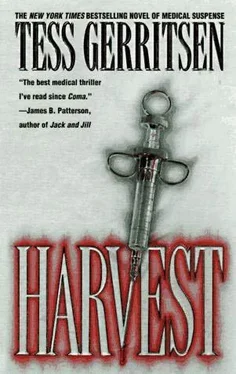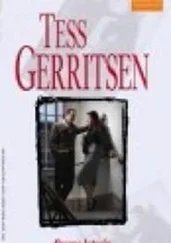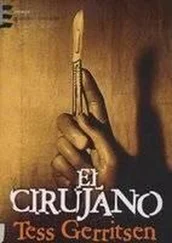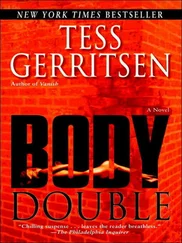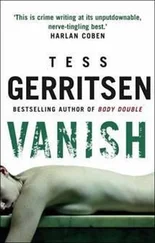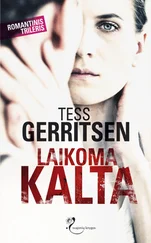Dr. Wetfig picked up the scalpel and stood with blade poised over the incision site. Abby waited for him to make the cut. He didn't. Instead he looked at Abby, his eyes a hard, metallic blue over the mask.
"How many open lung biopsies have you assisted on, DiMatteo?" he asked.
"Five, I think."
"You're familiar with this patient's history? Her chest films?"
"Yes, sir."
Wetfig held out the scalpel. "This one's yours, Doctor."
Abby looked in surprise at the scalpel, glittering in his hand. The General seldom relinquished the blade, even to his upper level residents.
She took the scalpel, felt the weight of stainless steel settle comfortably in her grasp. With steady hands, she made her incision, stretching the skin taut as she sliced a line along the rib's upper edge. The patient was thin, almost wasted; there was scant subcutaneous fat to obscure the landmarks. Another, slightly deeper incision parted the intercostal muscles.
She was now in the pleural cavity.
She slipped a finger through the incision and could feel the surface of the lung. Soft, spongy. "Everything all right?" she asked the anaesthesiologist.
"Doing fine."
"OK, retract," said Abby.
The ribs were spread apart, widening the incision. The ventilator pumped another burst of air, and a small segment of lung tissue ballooned out of the incision. Abby clamped it, still inflated. Again she glanced at the anaesthesiologist. "OK?"
"No problem."
Abby focused her attention on the exposed segment of lung tissue. It took only a glance to locate one of the nodules. She ran her fingers across it. "Feels pretty solid," she said. "Not good."
"No surprise," said Wettig. "She looked like a chemotherapy special on x-ray. We're just confirming cell type."
"The headache? Brain metastases?"
Wetfig nodded. "This one's aggressive. Eight months ago she had a normal chest x-ray. Now she's a cancer farm."
"She's eighty-four," said one of the nurses. "At least she had a long life."
But what kind of life? wondered Abby as she resected the wedge of lung containing the nodule. Yesterday, she had met Mary Allen for the first time. She had found the woman sitting very quiet and still in her hospital room. The shades had been drawn, the bed cast in semidarkness. It was the headaches, Mary said. The sun hurts my eyes. Only when I sleep does the pain go away. So many different kinds of pain…
Please, doctor, couldn't I have a stronger sleeping pill?
Abby completed the resection and sutured the cut edge of lung. Wetfig offered no comment. He merely watched her work, his gaze as chilly as ever. The silence was compliment enough; she'd learned long ago that just to escape the General's criticism was a triumph.
At last, the chest closed, the drain tube in place, Abby stripped off her bloodied gloves and deposited them in the bin labelled: contaminated.
"Now comes the hard part," she said, as the nurses wheeled the patient out of the OR. "Telling her the bad news."
"She knows," said Wettig. "They always do."
They followed the squeak of the gurney wheels to Recovery. Four post-op patients in various states of consciousness occupied the currained stalls. Mary Allen, in the last stall, was just beginning to stir. She moved her foot. Moaned. Tried to pull her hand free of the restraint.
With her stethoscope, Abby took a quick listen to the patient's lungs, then said: "Give her five milligrammes of morphine, IV."
The nurse injected an IV bolus of morphine sulphate. Just enough to dull the pain, yet allow a gentle return to consciousness. Mary's groaning ceased. The tracing on the heart monitor remained steady and regular.
"Post-op orders, Dr. Wettig?" the nurse asked.
There was a moment's silence. Abby glanced at Wetfig, who said, "Dr. DiMatteo's in charge here." And he left the room.
The nurses looked at each other. Wetfig always wrote his own post-op orders. This was another vote of confidence for Abby.
She took the chart to the desk and began to write: Transfer to 5 East, Thoracic Surgery Service. Diagnosis: Post-op open lung biopsy for multiple pulmonary nodules. Condition: stable. She wrote steadily: orders for diet, meds, activity. She reached the line for code status. Automatically she wrote: Full code.
She looked across the desk at Mary Allen, lying motionless on the gurney. Thought about what it would be like to be eighty-four years old and fiddled with cancer, the days numbered, each one filled with pain. Would the patient choose a kinder, swifter death? Abby didn't know.
"Dr. DiMatteo?" It was a voice over the intercom.
"Yes?" said Abby.
"You had a call from 4 East about ten minutes ago. They want you to come by."
"Neurosurg? Did they say why?"
"Something about a patient named Terrio. They want you to talk to the husband."
"Karen Terrio's not my patient any longer."
"I'm just passing the message along, Doctor."
"OK, thanks."
Sighing, Abby rose to her feet and went to Mary Allen's gurney for one last check of the cardiac monitor, the vital signs. The pulse was running a little fast, and the patient was moving, groaning again. Still in pain.
Abby looked at the nurse. "Another two milligrammes of morphine," she said.
The blip on the EKG monitor traced a slow and steady rhythm.
"Her heart's so strong," murmured JoeTerrio. "It doesn't want to give up. She doesn't want to give up."
He sat at his wife's bedside, his hand clasping hers, his gaze fixed on that green line squiggling across the oscilloscope. He looked bewildered by all the gadgetty in the room. The tubes, the monitors, the suction pump. Bewildered and afraid. He focused every ounce of attention on the EKG monitor, as though, if he could somehow master the secrets of that mysterious box, he could master everything else. He could understand why and how he had come to be sitting at the bedside of the woman he loved, the woman whose heart refused to stop beating.
It was 3 p.m., sixty-two hours since a drunk driver had slammed into KarenTerrio's car. She was thirty-four years old, HIV negative, cancer free, infection free. She was also brain dead. In short, she was a living supermarket of healthy donor organs. Heart and lungs. Kidneys. Pancreas. Liver. Bone. Corneas. Skin. With one terrible harvest, half a dozen different lives could be saved or changed for the better.
Abby pulled up a stool and sat down across from him. She was the only doctor who'd actually spent much time talking with Joe, so she was the one the nurses had called to speak to him now. To convince him to sign the papers and allow his wife to die. She sat quietly with him for a moment. Karen Terrio's body stretched between them, her chest rising and falling at a preselected twenty breaths per minute.
"You're right, Joe," said Abby. "Her heart is strong. It could keep going for some time. But not forever. Eventually the body knows. The body understands."
Joe looked across at her, his eyes red-rimmed with tears and sleeplessness. "Understands?"
"That the brain is dead. That there's no reason for the heart to keep beating."
"How would it know?"
"We need our brains. Not just to think and feel, but also to give the rest of our body a purpose. When that purpose is gone, the heart, the lungs, they start to fail." Abby looked at the ventilator. "The machine is breathing for her."
"I know." Joe rubbed his face with his hands. "I know, I know. I know. ."
Abby said nothing, Joe was rocking back and forth in his chair now, his hands in his hair, his throat squeezing out little grunts and whimpers, the closest thing to sobs a man could allow himself. When he raised his head again, clumps of his hair stood up damp and stiff with tears.
He looked up at the monitor again. The one spot in the room he seemed to feel was safe to stare at. "It all seems too soon."
Читать дальше
